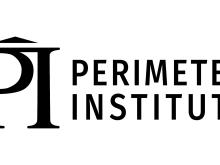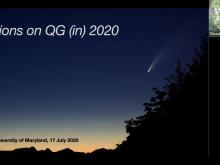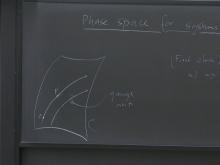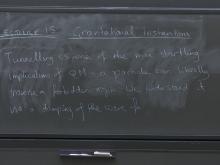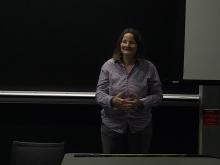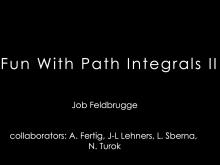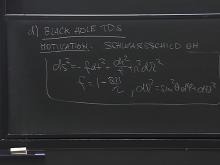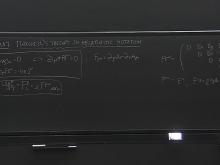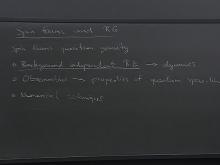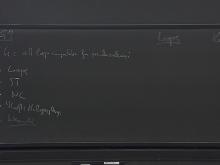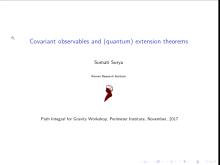Quantum gravity is concerned with unifying Einstein's general theory of relativity with quantum theory into a single theoretical framework. At Perimeter Institute, researchers are actively pursuing a number of approaches to this problem including loop quantum gravity, spin foam models, asymptotic safety, emergent gravity, string theory, and causal set theory. We are also particularly interested in experimental implications of these different proposals. As the aim is a unification of the laws of physics into a single theory, the search for quantum gravity overlaps with other areas such as cosmology, particle physics and the foundations of quantum theory.
Format results
-
29 talks-Collection NumberC22029
Talk
-

Welcome & Opening Remarks
-
Celine Zwikel Perimeter Institute for Theoretical Physics
-
Luca Ciambelli Perimeter Institute for Theoretical Physics
-
-

Review Talk: A primer on the covariant phase space formalism
Adrien Fiorucci Technische Universität Wien
-

Review Talk: A primer on the covariant phase space formalism cont.
Adrien Fiorucci Technische Universität Wien
PIRSA:22100003 -

Review Talk: An introduction to coadjoint orbits
Andrea Campoleoni University of Mons
-

Review Talk: An introduction to coadjoint orbits cont.
Andrea Campoleoni University of Mons
-

Gong Show
-
Arnaud Delfante University of Mons
-
Giovanni Canepa Aix-Marseille University
-
Gloria Odak Charles University
-
monireh ahmadpour University of Tehran
-
Florian Ecker Technische Universität Wien
-
-

Local Holography and corner symmetry: A paradigm for quantum gravity
Laurent Freidel Perimeter Institute for Theoretical Physics
-

Residual gauge symmetries in the front form
Sucheta Majumdar École Normale Supérieure de Lyon (ENS Lyon)
-
-
Quantum Gravity 2020
22 talks-Collection NumberC20031Talk
-

Welcome and Opening Remarks
Bianca Dittrich Perimeter Institute for Theoretical Physics
-

Approaches to Quantum Gravity: Key Achievements and Open Issues
Hermann Nicolai Max-Planck-Institut für Gravitationsphysik
-

Quantum gravity from the loop perspective
Alejandro Perez Aix-Marseille University
-

Lessons for quantum gravity from quantum information theory
Daniel Harlow Massachusetts Institute of Technology (MIT)
-

Understanding of QG from string theory
Herman Verlinde Princeton University
-

Progress in horizon thermodynamics
Aron Wall University of Cambridge
-

Asymptotically Safe Amplitudes from the Quantum Effective Action
Frank Saueressig Radboud Universiteit Nijmegen
-

The Remarkable Roundness of the Quantum Universe
Renate Loll Radboud Universiteit Nijmegen
-
-
PSI 2019/2020 - Quantum Gravity Part 1
6 talks-Collection NumberC20014Talk
-

PSI 2019/2020 - Quantum Gravity Part 1 - Lecture 1
Bianca Dittrich Perimeter Institute for Theoretical Physics
-

PSI 2019/2020 - Quantum Gravity Part 1 - Lecture 2
Bianca Dittrich Perimeter Institute for Theoretical Physics
-

PSI 2019/2020 - Quantum Gravity Part 1 - Lecture 3
Bianca Dittrich Perimeter Institute for Theoretical Physics
-

PSI 2019/2020 - Quantum Gravity Part 1 - Lecture 4
Bianca Dittrich Perimeter Institute for Theoretical Physics
-

PSI 2019/2020 - Quantum Gravity Part 1 - Lecture 5
Bianca Dittrich Perimeter Institute for Theoretical Physics
-

PSI 2019/2020 - Quantum Gravity Part 1 - Lecture 6
Bianca Dittrich Perimeter Institute for Theoretical Physics
-
-
PSI 2019/2020 - Gravitational Physics
15 talks-Collection NumberC20004Talk
-

PSI 2019/2020 - Gravitational Physics - Lecture 1
Ruth Gregory King's College London
-

PSI 2019/2020 - Gravitational Physics - Lecture 2
Ruth Gregory King's College London
-

PSI 2019/2020 - Gravitational Physics - Lecture 3
Ruth Gregory King's College London
-

PSI 2019/2020 - Gravitational Physics - Lecture 4
Ruth Gregory King's College London
-

PSI 2019/2020 - Gravitational Physics - Lecture 5
Ruth Gregory King's College London
-

PSI 2019/2020 - Gravitational Physics - Lecture 6
Ruth Gregory King's College London
-

PSI 2019/2020 - Gravitational Physics - Lecture 7
Ruth Gregory King's College London
-

PSI 2019/2020 - Gravitational Physics - Lecture 8
Ruth Gregory King's College London
-
-
Indefinite Causal Structure
26 talks-Collection NumberC19049Talk
-

-

10 years of the quantum SWITCH: state of the art and new perspectives
Giulio Chiribella University of Hong Kong (HKU)
-

Cyclic quantum causal models and violations of causal inequalities
Ognyan Oreshkov Université Libre de Bruxelles
-

TBA
Laura Henderson University of Waterloo
-

Composing causal orderings
Aleks Kissinger University of Oxford
-

Quantum principle of relativity
Andrzej Dragan University of Warsaw
-

-

What happens when we quantize time?
Alexander Smith Saint Anselm College
-
-
Emmy Noether Workshop: The Structure of Quantum Space Time
25 talks-Collection NumberC19047Talk
-

Welcome and Opening Remarks
Bianca Dittrich Perimeter Institute for Theoretical Physics
-

Quantum Spacetime from Lattice Gravity à la CDT
Renate Loll Radboud Universiteit Nijmegen
-

How complement maps can cure divergences
Sylvie Paycha University of Potsdam
-

The gravitational Wilson loop and the non-Abelian Stokes' theorem
Reiko Toriumi Okinawa Institute of Science and Technology Graduate University
-

The dynamics of difference
Lee Smolin Perimeter Institute for Theoretical Physics
-

-

Probing fundamental physics with gravitational waves
Cecilia Chirenti Universidade Federal do ABC
-

Implications of the Quantum Nature Space-time for the Big Bang and Black Holes
Abhay Ashtekar Pennsylvania State University
-
-
Simplicity III
17 talks-Collection NumberC19044Talk
-

On the possible role of nilpotent internal symmetries in unification
Andras Laszlo Wigner Research Centre for Physics
-

Rethinking the origin of neutrino masses: the role of gravity
Lena Funcke University of Bonn
-

Swampland Constraints on Neutrino Masses and Dark Energy
Irene Valenzuela European Organization for Nuclear Research (CERN)
-

-

Exceptional Quantum Algebra for the Standard Model of Particle Physics
Ivan Todorov Bulgarian Academy of Sciences
-

SO(7,7) Structure of Standard Model Fermions
Kirill Krasnov University of Nottingham
-

The Standard Model from A Jordan Algebra
Latham Boyle University of Edinburgh
-

Particle Theory from Jordan Geometry
Shane Farnsworth University of Regensburg
-
-
PSI 2019/2020 - Relativity (Kubiznak)
15 talks-Collection NumberC19039Talk
-

-

PSI 2019/2020 - Relativity (Kubiznak) - Lecture 2
David Kubiznak Charles University
-

PSI 2019/2020 - Relativity (Kubiznak) - Lecture 3
David Kubiznak Charles University
-

PSI 2019/2020 - Relativity (Kubiznak) - Lecture 4
David Kubiznak Charles University
-

PSI 2019/2020 - Relativity (Kubiznak) - Lecture 5
David Kubiznak Charles University
-

PSI 2019/2020 - Relativity (Kubiznak) - Lecture 6
David Kubiznak Charles University
-

PSI 2019/2020 - Relativity (Kubiznak) - Lecture 7
David Kubiznak Charles University
-

PSI 2019/2020 - Relativity (Kubiznak) - Lecture 8
David Kubiznak Charles University
-
-
PSI 2019/2020 - Classical Physics (Kubiznak)
8 talks-Collection NumberC19032Talk
-
PSI 2018/2019 - Explorations in Quantum Gravity (Dupuis)
15 talks-Collection NumberC19014Talk
-

PSI 2018/2019 - Explorations in Quantum Gravity - Lecture 1
-
Bianca Dittrich Perimeter Institute for Theoretical Physics
-
Maïté Dupuis Perimeter Institute for Theoretical Physics
-
-

PSI 2018/2019 - Explorations in Quantum Gravity - Lecture 2
Maïté Dupuis Perimeter Institute for Theoretical Physics
-

PSI 2018/2019 - Explorations in Quantum Gravity - Lecture 3
Maïté Dupuis Perimeter Institute for Theoretical Physics
-

PSI 2018/2019 - Explorations in Quantum Gravity - Lecture 4
Maïté Dupuis Perimeter Institute for Theoretical Physics
-

PSI 2018/2019 - Explorations in Quantum Gravity - Lecture 5
Maïté Dupuis Perimeter Institute for Theoretical Physics
-

PSI 2018/2019 - Explorations in Quantum Gravity - Lecture 6
Maïté Dupuis Perimeter Institute for Theoretical Physics
-

PSI 2018/2019 - Explorations in Quantum Gravity - Lecture 7
Maïté Dupuis Perimeter Institute for Theoretical Physics
-

PSI 2018/2019 - Explorations in Quantum Gravity - Lecture 8
Maïté Dupuis Perimeter Institute for Theoretical Physics
-
-
PSI 2017/2018 - Quantum Gravity (Dupuis)
15 talks-Collection NumberC17052Talk
-

PSI 2017/2018 - Quantum Gravity - Lecture 1
Beatrice Bonga Radboud Universiteit Nijmegen
-

PSI 2017/2018 - Quantum Gravity - Lecture 2
Maïté Dupuis Perimeter Institute for Theoretical Physics
-

PSI 2017/2018 - Quantum Gravity - Lecture 3
Maïté Dupuis Perimeter Institute for Theoretical Physics
-

PSI 2017/2018 - Quantum Gravity - Lecture 4
Maïté Dupuis Perimeter Institute for Theoretical Physics
-

PSI 2017/2018 - Quantum Gravity - Lecture 5
Maïté Dupuis Perimeter Institute for Theoretical Physics
-

PSI 2017/2018 - Quantum Gravity - Lecture 6
Maïté Dupuis Perimeter Institute for Theoretical Physics
-

PSI 2017/2018 - Quantum Gravity - Lecture 7
Maïté Dupuis Perimeter Institute for Theoretical Physics
-

PSI 2017/2018 - Quantum Gravity - Lecture 8
Maïté Dupuis Perimeter Institute for Theoretical Physics
-
-
The Path Integral for Gravity
18 talks-Collection NumberC17057Talk
-

Welcome and Opening Remarks
Neil Turok University of Edinburgh
-

The significance of the proper time in the quantum mechanics of the gravitational field.
Claudio Bunster Centro de Estudios Científicos (CECs)
-

TBA
Viatcheslav Mukhanov Ludwig-Maximilians-Universität München (LMU)
-

Semi-classical evaluation of the 3D gravity path integral and quasi-local holography
Bianca Dittrich Perimeter Institute for Theoretical Physics
-

-

An asymptotically safe point of view on the gravitational path integral
Astrid Eichhorn Universität Heidelberg
-

The path integral for gravity and Fedosov quantization
Stefan Hollands Universität Leipzig
-

Surprises in the Path Integral for Gravity
Neil Turok University of Edinburgh
-
-
Quantum Gravity Around the Corner
29 talks-Collection NumberC22029There has been recent activity in looking for new conserved charges and symmetries in gravity, most notably at infinity but also for finite regions. An important question is whether some of these charges and symmetries have physical implications. These charges are evaluated on codimension-2 surfaces called corners, which constitute the main focus of this conference. The goal is to bring together leading experts and promote discussions and exchanges among different approaches to (quantum) gravity.
Territorial Land Acknowledgement
Perimeter Institute acknowledges that it is situated on the traditional territory of the Anishinaabe, Haudenosaunee, and Neutral peoples.
Perimeter Institute is located on the Haldimand Tract. After the American Revolution, the tract was granted by the British to the Six Nations of the Grand River and the Mississaugas of the Credit First Nation as compensation for their role in the war and for the loss of their traditional lands in upstate New York. Of the 950,000 acres granted to the Haudenosaunee, less than 5 percent remains Six Nations land. Only 6,100 acres remain Mississaugas of the Credit land.
We thank the Anishinaabe, Haudenosaunee, and Neutral peoples for hosting us on their land.
-
Quantum Gravity 2020
22 talks-Collection NumberC20031 -
PSI 2019/2020 - Quantum Gravity Part 1
6 talks-Collection NumberC20014PSI 2019/2020 - Quantum Gravity Part 1 -
PSI 2019/2020 - Gravitational Physics
15 talks-Collection NumberC20004PSI 2019/2020 - Gravitational Physics -
Indefinite Causal Structure
26 talks-Collection NumberC19049There has been a surge of interest in indefinite causal structure the idea that cause and effect can no longer be sharply distinguished. Motivated both by experimentation with quantum switches and quantum gravity there can be situations in which there is no matter-of-the-fact as to what the causal structure of spacetime is. This meeting will bring together workers in Quantum Foundations and Quantum Gravity in both theoretical experimental physics to discuss the state of the art of current research and set new directions for this emerging subdiscipline.
-
Emmy Noether Workshop: The Structure of Quantum Space Time
25 talks-Collection NumberC19047Understanding the small-scale structure of spacetime is one of the biggest challenges faced by modern theoretical physics. There are many different attempts to solve this problem and they reflect the diversity of approaches to quantum gravity. This workshop will bring together researchers from a wide range of quantum gravity approaches and give them an opportunity to exchange ideas and gain new insights.
-
Simplicity III
17 talks-Collection NumberC19044This cross-disciplinary workshop gathers theorists who have been working on novel approaches to understanding the structure of the Standard Model and its link to cosmology and gravity. It follows the previous Simplicity I and II workshops at Princeton University (2014) and Fermilab (2016) and will be a small informal meeting with plenty of room for discussions.
-
PSI 2019/2020 - Relativity (Kubiznak)
15 talks-Collection NumberC19039PSI 2019/2020 - Relativity (Kubiznak) -
PSI 2019/2020 - Classical Physics (Kubiznak)
8 talks-Collection NumberC19032PSI 2019/2020 - Classical Physics (Kubiznak) -
PSI 2018/2019 - Explorations in Quantum Gravity (Dupuis)
15 talks-Collection NumberC19014PSI 2018/2019 - Explorations in Quantum Gravity (Dupuis) -
PSI 2017/2018 - Quantum Gravity (Dupuis)
15 talks-Collection NumberC17052PSI 2017/2018 - Quantum Gravity (Dupuis) -
The Path Integral for Gravity
18 talks-Collection NumberC17057Over the past three decades, the idea of a path integral over geometries, describing gravity in various dimensions, has become increasingly central to many areas of theoretical physics, including string and M-theory, holography and quantum aspects of black holes and cosmology.
In each of these areas, the path integral is frequently invoked as a formal device although, as practitioners will admit, except in very special cases the basic formula remains undefined. Typically, classical saddle points are discussed, whether real or complex, but the required integrals are left unperformed.
This state of affairs is untenable because it leaves the theory on a shaky footing and hence does not permit a sound comparison of theoretical predictions with observations. The time has come to critically reassess the foundational ideas of the path integral for gravity, including its definition, evaluation and interpretation; to identify problems with
existing uses and claims based on it, and to seek improvements. The workshop will focus on the continuum theory and its semiclassical limit, with applications to cosmology, black holes and holography. In particular, the notion of a “Euclidean path integral” for a “wavefunction of the universe” will be addressed.To this effect we intend to revisit discussion of “quantum geometrodynamics” from the path integral viewpoint and to pursue various applications. The developments in this direction that took place in the late 1970's and early 1980's were not incorporated in subsequent efforts, where the emphasis shifted to using a classical background with quantum fluctuations superimposed on it, a split which although useful in particular approximations can hardly be imagined to lie at the foundation of the theory. The revival of the discussion of the foundation of the path integral for gravity is made timely, we believe, by the introduction of new global methods such as Picard-Lefschetz theory.
The format of the workshop will be unusual. For the first three days, the mornings will begin with a longer, introductory lecture by each of the three organisers, setting out some of the foundational issues. This will be followed by shorter lectures by the participants, tackling the same foundational questions. The morning lectures, held in the Bob room, will be open to all Perimeter residents and visitors. They will be recorded and made available for viewing on PIRSA. Afternoons will be devoted to friendly and informal discussions, with participants invited to offer short contributions which follow up or develop points raised in the mornings, within a relaxed and highly conducive environment. Participation in these afternoon discussion sessions, as well as social events associated with the workshop, will be limited to registered workshop participants. The last two days of the workshop will be an opportunity for participants to continue discussions on topics which emerge as of greatest general interest, as well as to follow up in smaller groups on technical points or new ideas.
